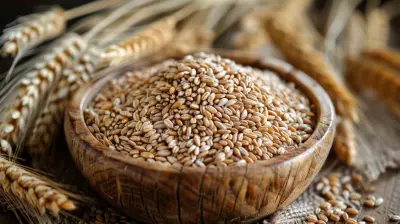Can Probiotics Help Prevent Cold and Flu?
22 March 2025
Have you ever wondered if something as simple as taking probiotics could shield you from that dreaded winter cold or the flu that seems to knock out everyone at the office? If you're like most people, you'd do just about anything to skip the sneezing, coughing, and fever. But are probiotics the magic bullet you’ve been searching for? Let’s dive into this fascinating topic and break it down together.
What Are Probiotics Exactly?
Before we dive into the cold and flu connection, let’s start with the basics. So, probiotics—what are they? Simply put, probiotics are live microorganisms (yeah, tiny living things!) that are good for your health, especially your gut. Think of them as the friendly bacteria that keep the not-so-friendly ones in check.You’ve probably heard of probiotics in yogurt commercials or seen them on the labels of supplements at your local health store. They’re also naturally found in fermented foods like kimchi, sauerkraut, kefir, and miso. Sounds pretty cool, right? Your gut has this bustling little ecosystem called the microbiome, and probiotics help keep it balanced. In the process, they can deliver a host of health benefits. But can they really help when it comes to avoiding colds and flu?
The Link Between Gut Health and Immunity
Here’s something you might not know: around 70% of your immune system resides in your gut. Yep, that’s not a typo. Your gut and immune system are BFFs, always working together to fight off invaders like viruses and harmful bacteria. It’s like having a security team on speed dial.When your gut is happy and healthy, its bacteria help your body do things like absorb nutrients, produce essential vitamins, and protect your immune system. On the flip side, if your microbiome is out of whack (think of it like a town overrun by bad guys), your immune defenses can take a hit. This could leave you more vulnerable to those seasonal sniffles, or worse, the flu.
So, Do Probiotics Prevent Cold and Flu?
Not to be a buzzkill, but let’s set realistic expectations here. Probiotics aren’t a magical armor that makes you invincible. However, research suggests that they may help reduce the severity and duration of cold and flu symptoms or even lower the chance of catching them in the first place. Let’s break it down.What Does the Science Say?
Scientists have been digging into how probiotics can influence the immune system, and some studies have shown promising results. For example:1. Shorter, Milder Illnesses: A meta-analysis published in the journal Nutrients found that people who regularly took probiotics were less likely to get respiratory infections, and when they did, their symptoms were usually milder and didn’t last as long.
2. Boosted Immune Responses: Probiotics, especially strains like Lactobacillus and Bifidobacterium, seem to stimulate the production of antibodies and white blood cells. Think of these like the soldiers of your immune system going to battle for you.
3. Reduced Sick Days: In a 2014 study, participants who took probiotics missed fewer days of work or school due to colds compared to those who didn’t. That’s a win in our book, especially if you’d rather avoid being stuck in bed with a box of tissues for company.
But here’s the kicker: not all probiotics are created equal. Different strains have different effects, so choosing the right one is key.
The Best Probiotic Strains for Immunity
Not sure which probiotic strains to look for? Don’t worry, I’ve got you covered. Here are a few rockstar strains known for their immune-boosting superpowers:1. Lactobacillus rhamnosus GG (LGG): This strain is like the MVP of probiotics. Studies show it can help reduce the duration of respiratory infections and even prevent them.
2. Bifidobacterium lactis Bl-04: Often found in yogurt and supplements, this strain has been shown to strengthen the immune response and may decrease the chance of catching a cold.
3. Lactobacillus acidophilus: Another powerhouse strain that supports the immune system, reducing the likelihood of respiratory infections.
4. Saccharomyces boulardii: Technically a yeast, not a bacteria, but still considered a probiotic, this one helps regulate the gut and keep your immune system humming along.
Next time you’re browsing the supplement aisle, keep an eye out for these names. Or better yet, check with a healthcare provider to get the lowdown.
How to Incorporate Probiotics Into Your Diet
Now that you know the benefits, it’s time to figure out how to actually get probiotics into your life. Good news—it’s not complicated.1. Fermented Foods
Probiotics naturally live in fermented foods. Think yogurt, kefir, kimchi, sauerkraut, and miso. Love pickles? Awesome—just make sure they’re the naturally fermented kind (skip the ones swimming in vinegar).2. Supplements
If fermented foods aren’t your jam, you can always go for a high-quality probiotic supplement. Capsules, powders, chewables—you’ve got options. Just make sure the supplement contains strains known for supporting immunity.3. Probiotic Drinks
Ever heard of kombucha or probiotic shots? These are fun, easy ways to sneak probiotics into your day. Plus, they’re kind of trendy, so you can feel fancy while you sip.Can Probiotics Replace the Flu Shot?
Hold on—don’t throw away your flu shot reminder just yet. While probiotics might help your immune system, they’re not a substitute for vaccines. The flu shot targets specific flu strains circulating each year, while probiotics work more broadly to support your overall immune health.Think of it like this: the flu shot is your front-line defense, while probiotics are reinforcements for your gut. Together, they make a pretty good team at keeping you healthy.
Other Tips to Stay Healthy During Cold and Flu Season
Probiotics are awesome, but they’re not the whole picture. Here are a few other simple (but effective) ways to boost your immune system:- Eat a Balanced Diet: Focus on fruits, veggies, whole grains, and lean protein. Your immune system loves nutrients like vitamin C, D, and zinc.
- Get Enough Sleep: Aim for 7-9 hours per night. Sleep is like a recharge button for your body.
- Stay Hydrated: Water is your best friend when it comes to flushing out toxins.
- Wash Your Hands!: It might sound obvious, but good hand hygiene is one of the best ways to dodge germs.
- Exercise: Regular movement can actually improve immune function (just don’t overdo it).
Are There Any Risks?
For most people, probiotics are safe, but they’re not for everyone. If you have a compromised immune system or a serious medical condition, check with your doctor before diving into the world of probiotics.Final Thoughts: Are Probiotics Worth It?
So, can probiotics help prevent cold and flu? The short answer: they can help. They’re not a cure-all, but they might give your immune system the support it needs to fight off those pesky viruses. At the very least, it’s worth considering, especially if you’re someone who gets sick every winter like clockwork.Just remember that no single supplement or food is the key to staying healthy. A well-rounded approach—good nutrition, sleep, exercise, and maybe a little help from probiotics—is your best bet.
all images in this post were generated using AI tools
Category:
Cold And FluAuthor:

Arthur McKeever
Discussion
rate this article
6 comments
Kaleb Wheeler
Probiotics: the tiny superheroes of your gut! While they might not don capes, they may help fight off colds and flu. Who knew a good bacteria could be your winter wingman?
April 16, 2025 at 2:57 PM

Arthur McKeever
Absolutely! Probiotics can support immune function, potentially reducing the risk of colds and flu. They're indeed our gut's unsung heroes!
Emily McPhee
Probiotics: the tiny warriors for your gut! While they might not wear capes, they sure know how to throw a party in there. Let’s just hope they can also fend off the pesky winter sniffles!
April 6, 2025 at 3:37 PM

Arthur McKeever
Great analogy! Probiotics do play a vital role in gut health, and while their impact on preventing colds is still being studied, they may boost overall immunity.
Yasmine Larsen
Thank you for this insightful article! The connection between probiotics and immune health is fascinating. It’s encouraging to see emerging research exploring their potential benefits in preventing colds and flu. I look forward to learning more about how probiotics can enhance overall wellness during colder months.
April 5, 2025 at 2:57 PM

Arthur McKeever
Thank you for your kind words! I'm glad you found the article insightful. The research on probiotics and immune health is indeed promising, and I look forward to sharing more updates on this fascinating topic!
Bear McMahon
Boost your immunity naturally!
April 4, 2025 at 3:49 PM

Arthur McKeever
Absolutely! Probiotics can support gut health, which plays a key role in immune function.
Velvet McGrady
Great article! It's so interesting how probiotics might play a role in boosting our immunity. With cold and flu season around the corner, I'm definitely considering adding more fermented foods to my diet. Thanks for sharing these insights! Stay healthy, everyone!
March 29, 2025 at 4:40 PM

Arthur McKeever
Thank you for your feedback! I'm glad you found the article insightful. Incorporating fermented foods is a great way to support your immune system. Stay healthy!
Adam Sharp
Probiotics may boost immunity, but washing hands and vaccines still reign supreme for cold prevention!
March 28, 2025 at 5:30 AM

Arthur McKeever
Absolutely, handwashing and vaccines are crucial for prevention, while probiotics can support overall immune health.




